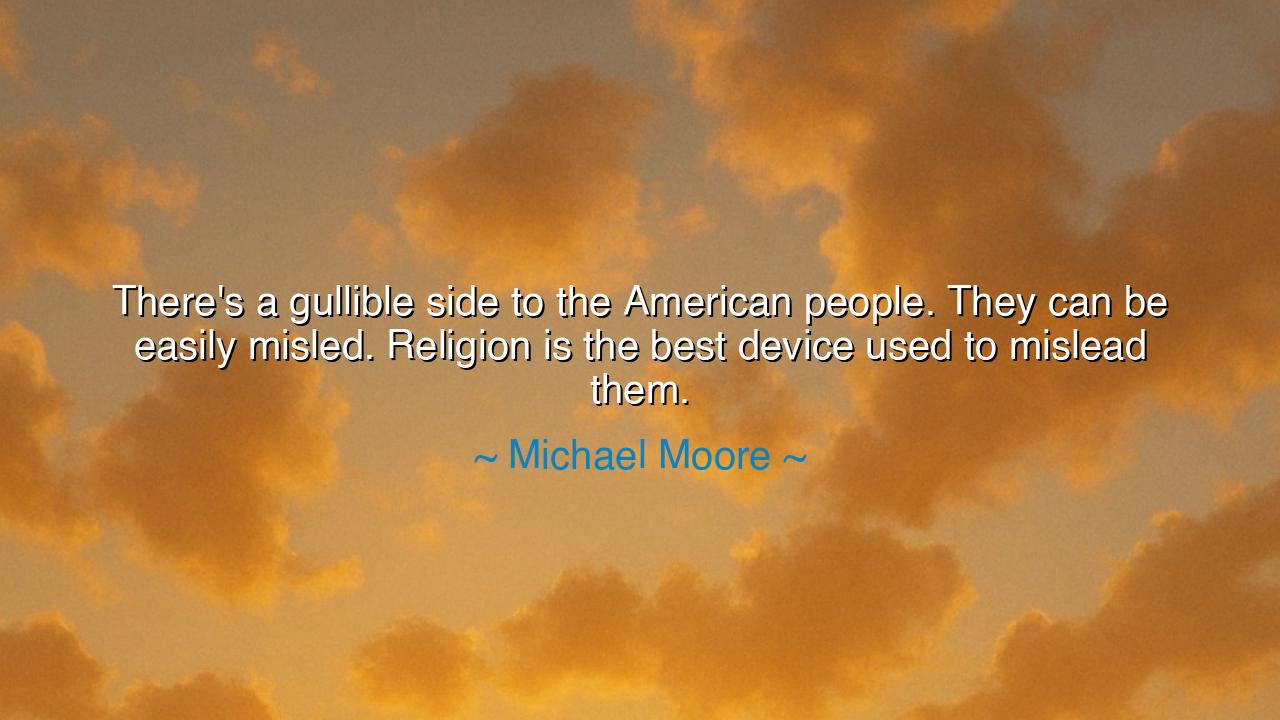
There's a gullible side to the American people. They can be
There's a gullible side to the American people. They can be easily misled. Religion is the best device used to mislead them.






In the intricate weave of human history, there are certain truths that echo through the ages, whispers of the past warning the future about the ways in which power and manipulation can shape the lives of the many. Michael Moore, with his sharp eye for the social dynamics of America, offers a piercing insight into the susceptibility of the human spirit: "There's a gullible side to the American people. They can be easily misled. Religion is the best device used to mislead them." These words strike at the heart of a larger human condition, one that transcends national boundaries and resonates in every corner of civilization—the tendency to fall prey to falsehoods, especially when they are cloaked in the language of the divine.
The idea that people can be easily misled is as old as humanity itself. In every great civilization, whether the ancient Egyptians, the Romans, or the Greeks, leaders have long understood the power of belief and faith to control the masses. Religion, in its purest form, offers answers to the mysteries of life, death, and existence, but it also carries with it the potential to be used as a tool of manipulation. The ancient pharaohs of Egypt, for example, were both political rulers and divine figures, wielding their religious status to maintain power and control over their people. They wrapped themselves in the mantle of divinity, demanding loyalty and obedience not only as kings but as gods on earth. In this way, religion became a device that kept the masses in check, and this dynamic is not new—it echoes through the corridors of history.
In more recent times, the relationship between religion and manipulation has been seen in the rise of authoritarian regimes that have used religion to consolidate power. Take the example of the Spanish Inquisition, where the Church's power was wielded with brutal force to suppress heresy and enforce a specific orthodoxy. In the name of God, the Spanish crown justified torture, imprisonment, and execution, using religion as a means to control and manipulate the beliefs and actions of the people. Religion, when used as a tool of control, creates an environment where critical thinking and independent thought are not just discouraged but punished. Michael Moore’s words highlight the gullibility of the masses when religious belief is exploited for political or economic gain.
But what does it mean when Moore speaks of “gullibility”? It is not a simple accusation, but rather a reflection on the human tendency to follow, to believe without questioning. Gullibility, in this sense, is a vulnerability inherent in the human heart, a desire for certainty and security that often blinds us to the complexities and contradictions of the world around us. People, in their search for meaning and comfort, are often more willing to accept comforting doctrines than to confront the uncomfortable truths of life. Religion, as Moore suggests, can prey upon this vulnerability, offering simple answers to complex questions, and in doing so, diverting people from the harder path of self-reflection and personal accountability.
This dynamic is poignantly illustrated in the history of the Great Awakening in the 18th century, a religious revival that swept through the American colonies. Preachers such as Jonathan Edwards used fire and brimstone rhetoric to inspire fear and obedience among their congregations, telling them that only through strict adherence to religious doctrine could they avoid eternal damnation. The fervor of the revival ignited a wave of spiritual enthusiasm, but it also served as a reminder of how easily faith can be manipulated by those in power. Moore’s assertion that religion can be used to mislead is rooted in this same history, a history where charismatic leaders have exploited the vulnerabilities of the faithful to maintain influence and control.
Yet, while Moore’s words may carry a warning about the dangers of blind faith, they also present a call to action—to reclaim personal sovereignty in the face of manipulation. The lesson here is not that religion itself is inherently bad, but that it must be approached with awareness, discernment, and a critical mind. It is not enough to simply accept the truths handed down by others; we must each take responsibility for our own beliefs, testing them against the larger truths of the world, the natural order, and our own conscience. This is not a rejection of faith, but a call to understand it not as a tool for control, but as a means to enlighten and empower the individual.
The path forward, then, is one of self-awareness and reflection. We must seek to understand the power of belief and how it can be both a force for good and a source of harm. In our own lives, we must be vigilant, questioning the systems that seek to control us, whether they come in the form of religion, politics, or society. By developing the discipline to think critically and the courage to question, we can free ourselves from the shackles of manipulation and gullibility, choosing instead to live lives of conscious freedom. Moore’s challenge is to recognize the power of belief, and to wield it with wisdom, integrity, and an unwavering commitment to truth.






AAdministratorAdministrator
Welcome, honored guests. Please leave a comment, we will respond soon